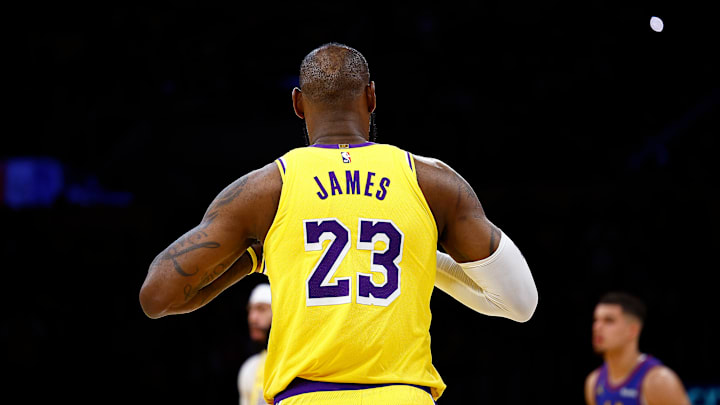Whether you believe he's the greatest of all time or not, LeBron James is unlike any player in NBA history. The Los Angeles Lakers superstar has broken records previously perceived as untouchable, with a level of longevity that has far exceeded anything the Association had seen before.
As James approaches his age-40 season in which elite play is still expected, however, there's a question looming over both his career and the Lakers organization: What's next?
James has a player option for the 2024-25 regular season worth $51,415,938. Most expect the four-time Finals MVP to decline the option and pursue a multi-year deal in free agency, presumably to return to the Lakers and attempt to win another championship alongside Anthony Davis.
According to Jovan Buha and Shams Charania of The Athletic, the Lakers are willing to pay James anything that he asks for to re-sign him this summer.
"The coaching hire is pivotal as Los Angeles hopes to retain James, who must decide whether to exercise his $51.4 million player option for the 2024-25 season by June 29. The Lakers are open to any contract structure that will keep James in Los Angeles, league sources told The Athletic."
That seems like a simple decision considering we're talking about LeBron James, but the context makes the conversation a bit more complicated.
For how much longer will LeBron James be elite?
For several seasons, James has redefined the laws of Father Time by playing and producing at an unprecedented level for a player his age. James will turn 40 during the early months of the 2024-25 regular season and will thus have another chance to rewrite expectations.
For as remarkable as that is, the catch with a player performing at an unprecedented level is that no one knows when it's going to end.
It's possible that James will continue to do what he's always done: Defy the odds and play at an All-NBA level until the day he retires. It's also possible that Father Time will remain undefeated and rear its head when even the most ardent of James critics least expect it.
It's why re-signing him to a multi-year deal at a max-level figure is a risky endeavor, even if it ultimately proves to be the right thing to do.
James is still one of the best players in the NBA. He earned All-NBA Third Team honors in 2024-25 after averaging 25.7 points, 8.3 assists, 7.3 rebounds, 1.3 steals, and 2.1 three-point field goals made on a career-best mark of 41.0 percent shooting from beyond the arc.
Between his production and the fact that he's one of the two best players on a team that reached the Playoffs, it seems hard to believe that he'll decline anytime soon—but even a superhuman player has limitations.
One could argue that we've already seen James'.
The tough conversation
James has spent six seasons as a member of the Lakers organization. During that time, he's appeared in at least 60 games on just two occasions—a startling number that has perhaps been swept under the rug because of how great he is when he's available and on the court.
James was able to play 71 games in 2023-24, his most as a Laker, but it would be fair to view his inconsistent availability as a cause for concern in negotiations.
Yes, two of the seasons in which James has been a Laker were shortened by COVID restrictions. 2019-20 was one of the two seasons in which he exceeded 60 games played, however, and he appeared in just 62.5 percent of Los Angeles' outings in 2020-21—equal to a rounded-up 52 games played in an 82-game season.
For a different perspective, James missed 27 games in 2018-19, another 27 in 2020-21, 26 in 2021-22, and yet another 27 in 2022-23.
As the Lakers consider re-signing James to a multi-year deal, this fact must be considered. He's missed at least 26 games in four of his six campaigns in purple and gold, and being able to endure an 82-game schedule doesn't exactly get easier the older a player gets.
James is certifiably elite when he's on the court, but with salary cap restrictions effectively limiting teams to two max-level players if they want a balanced roster, there's a risk in re-signing him—especially when one considers Davis' own injury history.
The reality check
As difficult as it is to process this information, there's a reality that the Lakers are coming to terms with. It requires a leap of faith to believe that James will sustain his elite level of play and remain healthy enough to help the Lakers achieve top-4 seeding in the Western Conference.
With Davis signed through the 2027-28 season, however, a duo that won a title just four years ago and reached the Conference Finals as recently as last season shouldn't be so easily split up.
When both are healthy, Davis and James are still one of the most dominant duos in the NBA. In 2023-24, across the 3,615 possessions for which they were on the court together, the Lakers ranked in the 76th percentile in net rating and the 91st percentile in eFG%, per Cleaning the Glass.
It doesn't take a quantum leap to believe that an improved supporting cast could help the Lakers sustain and even build upon that success in a manner that could extend James' career—or help him stay healthy.
Re-signing James to a multi-year deal is still a risky endeavor, but it's one worth taking. He's one of the greatest players to ever hold a basketball, and even if he ultimately declines at some point during his contract, his skill, power, and intelligence can fit within a strong rotation.
The only real question is: What are the Lakers going to do to surround James and Davis with enough talent to maximize their remaining elite seasons?
